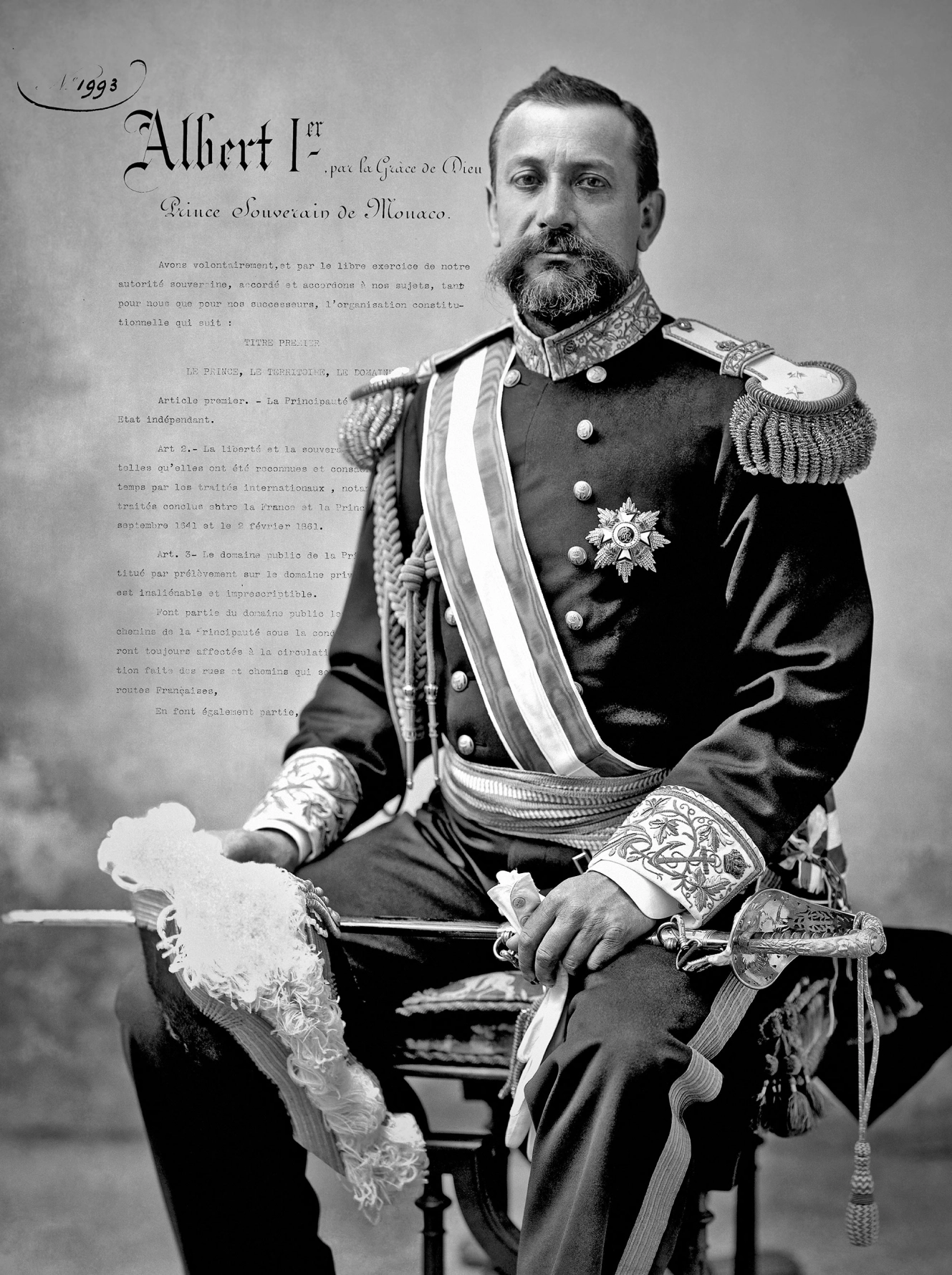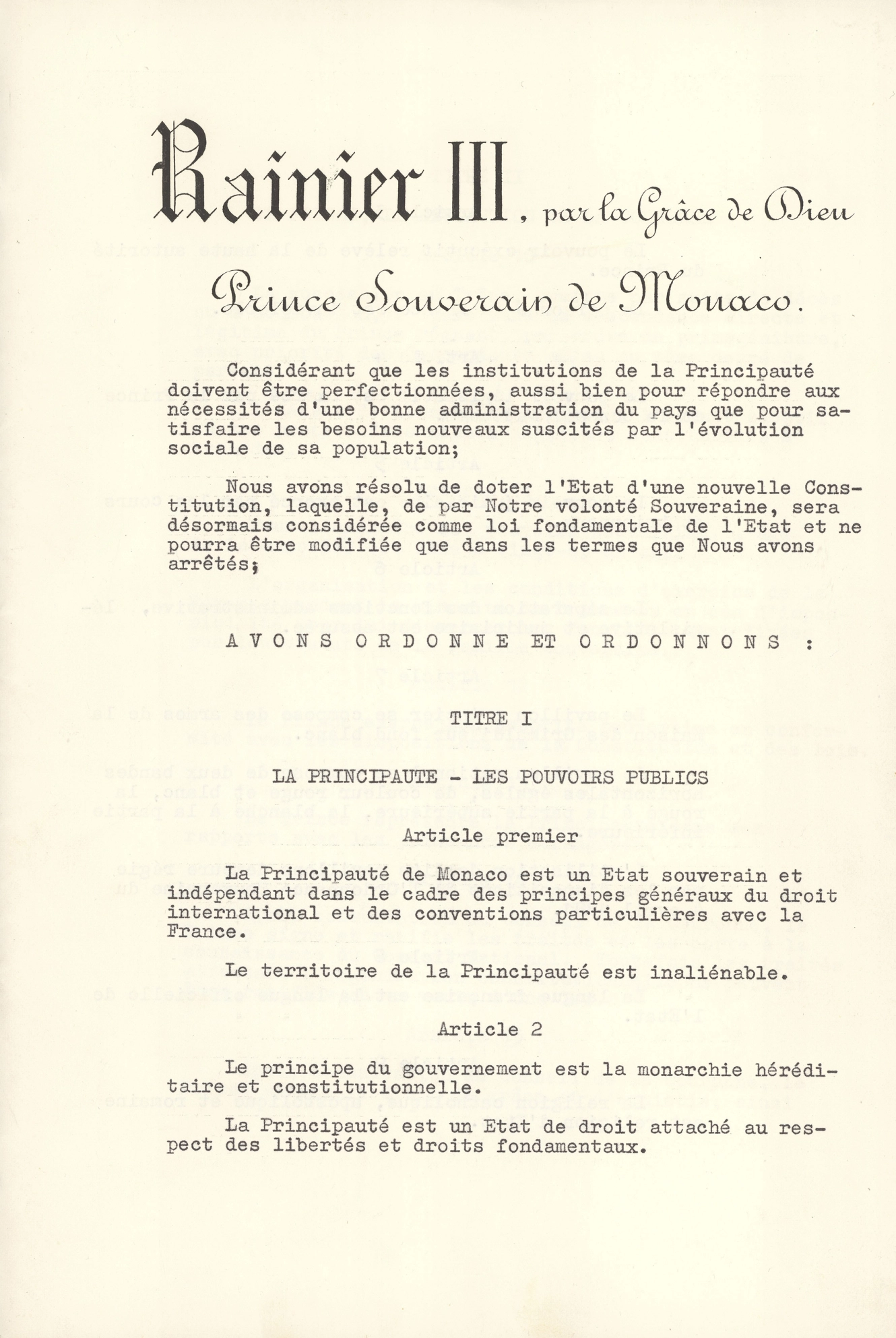
Assertion of the rule of law
1911 - 2002: Constitution evolves to support the rule of law
In 1911, the Principality of Monaco adopted a constitution. The organisation of the country’s institutions, commissioned and led by Prince Albert I (1848–1922) to meet the aspirations of its population, modernised the Principality’s politics.
The 1911 act established and defined the boundaries of the public sphere, provided a framework for government and introduced the sharing of legislative authority between the Prince and a National Council, whose members were to be elected from among men of Monegasque nationality. Basic freedoms and rights, a vital element of a state governed by the rule of law, were enshrined in Chapter II: individual freedom, religious freedom and the right of ownership.
The Constitution of 17 December 1962 marked a significant development in this direction, responding – in the words of Prince Rainier III that day, to two needs: "improving institutions" and "meeting the legitimate wishes of the population as reflected through the National Council" by introducing a "new ethos into old frameworks".
The Principality truly became a state governed by the rule of law, in which the Constitution could no longer be suspended. This Constitution, which was more liberal than the 1911 version, committed to protecting all fundamental rights and freedoms – political, economic and social. Women were granted the right to vote in all elections and the death penalty was abolished.
In 2002, the prospect of joining the Council of Europe reached a decisive turning point by means of the constitutional amendment promoted by Prince Rainier III. Membership implied harmonising the Principality’s international status and Monegasque legislation with the Council of Europe’s recommendations: strengthening the remit of the National Council, extending civil rights to women and foreign nationals, and lowering the age of majority to 18 years. This meant that legislative initiative was better asserted, and the right to amend bills proposed by the Government (with the exception of the budget bill) was granted. With regard to foreign relations, the National Council’s remit was expanded to include treaties and agreements.
The rule of law was affirmed.
Since 2002: Monaco continues its commitment to the rule of law
With a Constitution aligned with the standards of a modern state governed by the rule of law, the Principality demonstrates its commitment through both its organisation and its
active participation in the Committee of Ministers and the Parliamentary Assembly of the Council of Europe.
At the national level, the Constitution guarantees the separation of powers. The Supreme Court is central to the expression of the rule of law, in that it adjudicates on fundamental rights and abuses of power. There is full respect for the hierarchy of norms. As such, the ratification of the European Convention on Human Rights in 2005 means that persons seeking justice have the option of applying to the European Court of Human Rights, offering an additional layer of jurisdiction. Consequently, the Court’s judgments and decisions apply in Monaco. The national courts are responsible for ensuring compliance with the Convention and the ensuing case law.
Monaco has also consolidated the rule of law through an act covering the status of judiciary in 2009, and an act pertaining to judicial organisation and operation, which established the High Council of Judges and Prosecutors in 2013. The Council guarantees the independence of the legal system. Finally, the modernisation of the regulations governing the Supreme Court in 2015 brought the institution in line with European standards. Monaco has also added to its body of legislation on the basis of the recommendations issued by the various committees of the Council of Europe. In 2006, Monaco adopted a law making it mandatory to provide a reason for negative administrative acts, as well as legislation on gender equality.
Since 2006, 16 laws have been passed to strengthen efforts to combat corruption and money laundering, in line with the recommendations emanating from the monitoring mechanisms of the Group of States against Corruption (GRECO) and the Committee of Experts on the Evaluation of Anti-Money Laundering Measures and the Financing of Terrorism (MONEYVAL). In 2017, following its ratification of the Convention on Cybercrime, Monaco incorporated into its legislation a full arsenal of tough measures to tackle this new form of crime. Finally, in line with its commitments, Monaco established a High Commissioner for the Protection of Rights, Liberties and for Mediation in 2013, and a Committee to Promote and Safeguard Women’s Rights in 2018.




